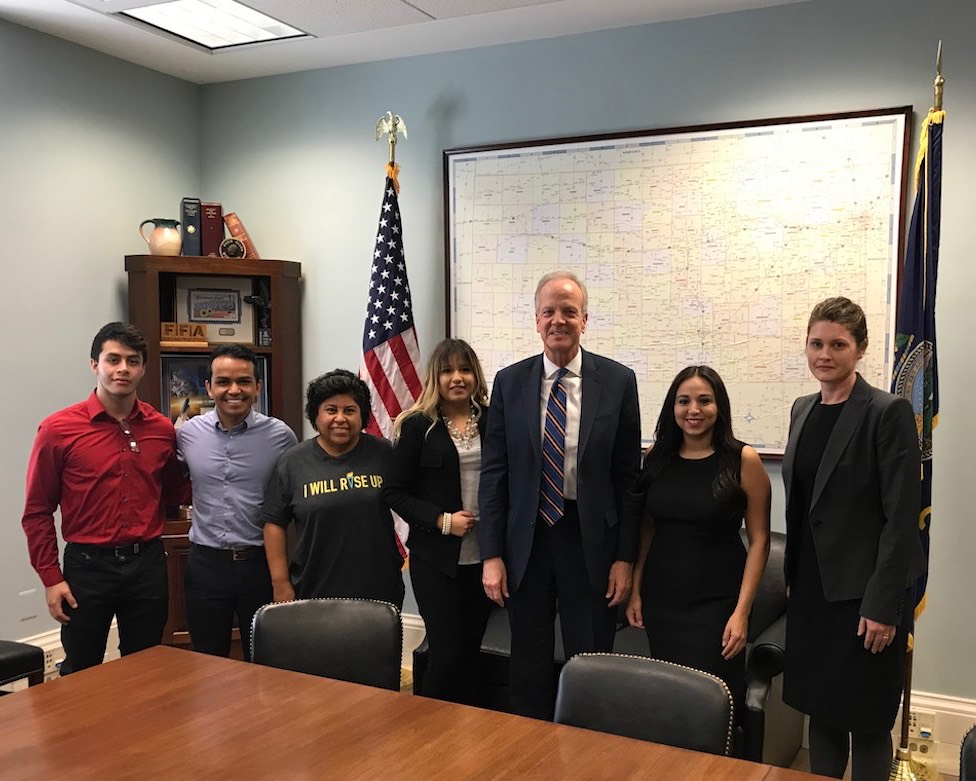Wichita State University graduate Sarahi Aguilera considered herself shy for most of her life. Her status as an undocumented immigrant limited what she thought herself capable of saying or doing.
That perception changed in 2017 when she traveled to Washington, D.C., as part of delegation of college students who talked to politicians about their stories and Deferred Action for Childhood Arrivals (DACA).
Sulma Arias, national immigration director at Community Change in Washington, D.C., saw the change happen.
“The entire movement had a life-changing impression on her,” said Arias, who grew up in Wichita and attended North High School. “She was one of the young women who said, ‘I want to do this. I want to figure out how I can work to change the situation.’”
DACA is the 2012 policy that allows some individuals with unlawful presence in the United States after being brought to the country as children to receive a renewable two-year period of deferred action from deportation and become eligible for a work permit in the United States. In September 2017, the Department of Homeland Security announced the termination of the program. In June, the Supreme Court temporarily blocked that action on administrative grounds.
Aguilera started volunteering with Sunflower Community Action in 2018 while a student at Seward County Community College. Later that year, she transferred to Wichita State and took a job as an immigrant justice organizer at Sunflower Community Action. In May, she graduated with a major in criminal justice and a psychology minor. She wants to attend law school and work in immigration law.
“I wasn’t very proud of who I was back then,” she said. “I was scared of the reaction that I was going to get from people once they found out I was undocumented. Once I was able to share my story and inspire others to do so, it brought out this power within myself that I am able to pursue and do anything that I want, regardless of my legal status.”
In June, Aguilera hosted the ICT Standing with DREAMers event at Nomar Plaza to support DACA. The Supreme Court decision increased hopes for that community. People, she said, can focus on their education and their careers without fear of deportation.
“Hopefully, this decision has uplifted people to continue to fight,” she said. “Hopefully, we can have a pathway to citizenship. It’s an amazing opportunity, but, as we all know, it’s not a permanent solution. I hope it’s the energy we needed to continue to fight.”
The 2017 attempt to end DACA overshadowed her schooling and her potential career choices. The Supreme Court decision makes it easier to work and plan for the future.
“It was like a weight off my shoulder,” she said. “It was something that had been troubling me since 2017, not knowing what my future was going to be looking like. I didn’t know if I was going to be able to go out there and work in my field.”
Aguilera came to Liberal, Kansas, in 2007 from Mexico at age 8 with her parents and younger sister. She has two brothers who were born in the United States. She sees law school as a way to help families in similar situations.
“There’s a lot of people out there who don’t get the help that they deserve,” she said. “Hopefully, I can one day open up my own law firm and have legal clinics, or do any kind of legal work, for people who were once in my shoes. I know it can be very expensive, so I know having that support and that knowledge can make a huge difference.”
Her work with student organizations at Wichita State provided experience working with people. Her relationships with faculty and friends helped her navigate the unfamiliar path of law school applications.
“It was a great experience to see the diversity of students we have at Wichita State University, and the support, from not only the advisors, but from the administration and the fellow students,” she said. “It made an impact in my life. I was able to create some connections that really guided me.”


 Courtesy photo
Courtesy photo